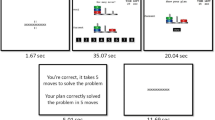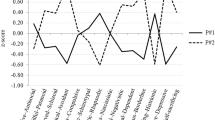Abstract
The accuracy of depressed and nondepressed subjects' perceptions of their own and a social interactional partner's performance was investigated. Twenty depressed and twenty nondepressed college students participated in dyadic interactions and then rated their own and their partner's social behavior. The interactions were also rated by objective coders. Depressed subjects were differentiated from nondepressed subjects on several measures by both the coders and the subjects. Depressed subjects' self-ratings were correlated with the coders' ratings more often than were the nondepressives' ratings, suggesting depressives provided more accurate self-observations. Contrary to prediction, depressives were also more accurate in judging their partner's behavior. Depressives experienced heightened levels of self-focused attention, but this attentional focus did not mediate the relationship between depression level and self-accuracy. Finally, an analysis of the verbal statements suggests that performance differences between depressives and nondepressives may be a function of the quantity, rather than the quality, of the verbal production.
Similar content being viewed by others
References
Alloy, L. B., & Abramson, L. Y. (1988). Depressive realism: Four theoretical perspectives. In L. B. Alloy (Ed.),Cognitive processes in depression (pp. 223–265). New York: Guilford.
American Psychiatric Association (1980).Diagnostic and statistical manual (3rd ed.). Washington, DC: APA.
Argyle, M. (1969).Social interaction. London: Metheun.
Arkowitz, H. (1981). Assessment of social skills. In M. Hersen & A. S. Bellack (Eds.),Behavioral assessment: A practical handbook (2nd ed., pp. 296–327). New York: Pergamon Press.
Arkowitz, H., Lichtenstein, E., McGovern, K., & Hines, P. (1975). The behavioral assessment of social competence in males.Behavior Therapy, 6, 3–13.
Beach, S. R. H., Sandeen, E. E., & O'Leary, K. D. (1990).Depression in marriage. New York: Guilford.
Beck, A. T. (1967).Depression: Clinical, experimental, and theoretical aspects. New York: Harper & Row.
Beck, A. T., Ward, C. H., Mendelson, M., Mock, J., & Erbaugh, J. (1961). An inventory for measuring depression.Archives of General Psychiatry, 4, 53–63.
Bellack, A. S., Hersen, M., & Turner, S. M. (1978). Role-play tests for assessing social skills: Are they valid?Behavior Therapy, 9, 448–461.
Buss, A. H. (1980).Self-consciousness and social anxiety. San Francisco: W. H. Freeman.
Carver, C. S., & Glass, D. C. (1976). The self-consciousness scale: A discriminant validity study.Journal of Personality Assessment, 40, 169–172.
Carver, C. S., & Scheier, M. F. (1981).Attention and self-regulation: A control-therapy approach to human behavior. Berlin: Springer-Verlag.
Cohen, J. (1960). A coefficient of agreement for nominal scales.Educational and Psychological Measurement, 20, 37–46.
Conger, J. C., & Conger, A. J. (1982). Components of heterosocial competence. In J. P. Curran & P. M. Monti (Eds.),Social skills training: A practical handbook for assessment and treatment (pp. 313–347). New York: Guilford Press.
Coyne, J. C. (1976). Depression and the response of others.Journal of Abnormal Psychology, 85, 186–193.
Davis, D., & Brock, T. C. (1975). Use of first-person pronouns as a function of increased objective self-awareness and prior feedback.Journal of Experimental Social Psychology, 1, 381–675.
Duval, S., & Wicklund, R. A. (1972).A theory of objective self-awareness. New York: Academic Press.
Eisler, R. M., Miller, P. M., & Hersen, M. (1973). Components of assertive behavior.Journal of Clinical Psychology, 29, 294–299.
Exner, J. E., Jr. (1973). The self-focus sentence completion: A study of egocentricity.Journal of Personality Assessment, 37, 437–455.
Fenigstein, A., Scheier, M. F., & Buss, A. H. (1975). Public and private self-consciousness: Assessment and theory.Journal of Consulting and Clinical Psychology, 43, 522–527.
Gibbons, F. X. (1987). Mild depression and self-disclosure intimacy: Self and others' perceptions.Cognitive Therapy and Research, 11, 361–380.
Gibbons, F. X., Smith, T. W., Ingram, R., Pearce, K., Brehm, S. S., & Schroeder, D. (1985). Effects of self-focused attention on members of a clinical population.Journal of Personality and Social Psychology, 48, 662–675.
Gotlib, I. H., & Meltzer, S. J. (1987). Depression and the perception of social skill in dyadic interaction.Cognitive Therapy and Research, 11, 41–54.
Gotlib, I. H., & Robinson, L. A. (1982). Responses to depressed individuals: Discrepancies between self-report and observer-rated behavior.Journal of Abnormal Psychology, 91, 231–240.
Ingram, R. E. (1990). Self-focused attention in clinical disorders: Review and a conceptual model.Psychological Bulletin, 107, 156–176.
Ingram, R. E., & Smith, T. W. (1984). Depression and internal versus external focus of attention.Cognitive Therapy and Research, 8, 139–151.
Jacobson, N. S., & Anderson, E. A. (1982). Interpersonal skill and depression in college students: A sequential analysis of the timing of self-disclosures.Behavior Therapy, 13, 271–282.
Kahn, J., Coyne, J. C., & Margolin, G. (1985). Depression and marital disagreement: The social construct of despair.Journal of Social and Personal Relationships, 2, 447–461.
Kendall, P. C., Hollon, S. D., Beck, A. T., Hammen, C. L., & Ingram, R. E. (1987). Issues and recommendations regarding use of the Beck Depression Inventory.Cognitive Therapy and Research, 11, 289–299.
Kowalik, D., & Gotlib, I. H. (1987). Depression and marital interaction: Concordance between intent and perception of communication.Journal of Abnormal Psychology, 96, 127–134.
Lewinsohn, P. M., Hoberman, H., Teri, L., & Hautzinger, M. (1985). An integrative theory of depression. In S. Reiss & R. Bootzin (Eds.),Theoretical issues in behavior therapy (pp. 331–359). New York: Academic Press.
Lewinsohn, P. M., Mischel, W., Chaplin, W., & Barton, R. (1980). Social competence and depression: The role of illusory self-perceptions.Journal of Abnormal Psychology, 89, 203–212.
Libet, J., & Lewinsohn, P. M. (1973). The concept of social skills with special reference to the behavior of depressed persons.Journal of Consulting and Clinical Psychology, 41, 304–312.
McFall, R. (1982). A review and reformulation of the concept of social skills.Behavioral Assessment, 4, 1–33.
Morrison, R. L., & Bellack, A. S. (1981). The role of social perception in social skill.Behavior Therapy, 12, 69–79.
Musson, R. F., & Alloy, L. B. (1988). Depression and self-directed attention. In L. B. Alloy (Ed.),Cognitive processes in depression (pp. 193–220). New York: Guilford.
Roth, D., & Rehm, L. P. (1980). Relationships among self-monitoring processes, memory, and depression.Cognitive Therapy and Research, 4, 149–157.
Smith, T. W., & Greenberg, J. (1981). Depression and self-focused attention.Motivation and Emotion, 5, 323–331.
Strack, S., & Coyne, J. C. (1983). Social confirmation of dysphoria shared and private reactions to depression.Journal of Personality and Social Psychology, 44, 798–806.
Turner, R. A., Scheier, M. F., Carver, C. S., & Ickes, W. (1978). Correlates of self-consciousness.Journal of Personality Assessment, 42, 285–289.
Twentyman, G. T., & McFall, R. M. (1975). Behavioral training of social skills in shy males.Journal of Clinical and Counseling Psychology, 43, 384–395.
Author information
Authors and Affiliations
Rights and permissions
About this article
Cite this article
Edison, J.D., Adams, H.E. Depression, self-focus, and social interaction. J Psychopathol Behav Assess 14, 1–19 (1992). https://doi.org/10.1007/BF00960089
Accepted:
Issue Date:
DOI: https://doi.org/10.1007/BF00960089




